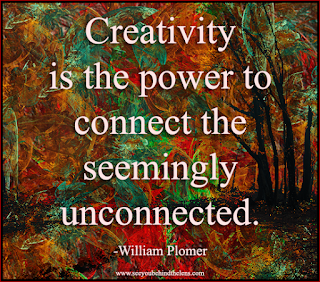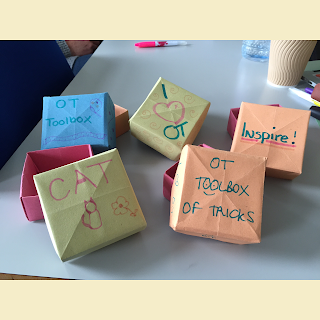Community Mental Health.
My first couple of weeks with the community mental health team has been spent mostly by me getting to grips with the complex range of conditions, environments and even the many different roles within the team. Although the format of the team is similar to the community teams I've spent previous placements with, there are a lot more professionals and roles for example; OT's, support workers, CBT therapists, DBT therapists, social workers, nurses, clinical psychologist and pharmacist. It is an excellent opportunity for me to see the many different professions and how they work together to provide the service. I have seen this through attending various MDT meetings and clinical discussion meetings, which have given me a really good insight and enabled me to voice my views and opinions on service users that I have met on community visits.
So far I have spent time on visits with the OT's and a couple of the support workers in the team. This has enabled me to see a variety of service users with varying mental health conditions. Within the team here the OT's practice by using the framework of the CMOP-E and by using this I have been able to go out with support workers and reflect afterwards, using this model to assist me in having a holistic occupation focus. Although the OT's use the COPM - I am yet so see this or assist in administering this assessment tool as a lot of the service users have had OT involvement for a long period of time and are currently not in need of this assessment. Although I have seen very little standardised assessment tools, I have seen the importance of observation skills within community visits.
Community mental health OT differs quite a lot from my experience in physical community settings. This is because recovery in mental health is a very different process. It is discussed by Lloyd, Wong & Petchkovsky (2007) as a subjective and individualised process:
"Unlike the biomedical definition of recovery, it is not a predictable and medically mediated process, but the emergence of a new identity as a product of self-discovery." (p. 207).
Due to this, I have observed that the OT process involving individuals with mental health conditions can be a very long process and often very cyclical, remaining on the goal setting, intervention/assessment and evaluation stages, changing as a person progresses or adapting for varying needs relating to their condition. OT in mental health appears to be a lengthy process with service users facing many set-backs and barriers to their OT interventions. Some of which include, drug addictions, low motivation, low mood and impaired sense of safety-health and well being etc.
It is very interesting to have seen both sides of community OT within my placement experiences and to be able to contrast and compare the two. Due to the nature of this setting, I feel it is going to be more difficult to perform at the higher level expected for this placement and I have found this difficult during the past two weeks as I have needed this time to 'find my feet' and get to grips with the new conditions I am experiencing and how the team works.
In-patient Unit
During placement I will be spending one day a week on the in-patient unit and my first day on the inpatient ward was a
totally new experience for me. At first I did feel a little apprehensive on the
ward as I observed the impact of severe mental health conditions upon the
occupational identity, roles, habits, motivation and routines of individuals. I
observed the OT using MOHO based screening tools to interview individuals to
assess their occupational profile, using narrative clinical reasoning skills to
build up an occupational picture of how that person has been in the past, what
they are functioning like currently and what they want to do in their future. A
shock for me was the impact of their current mental state as the individual
being interviewed currently felt that they had no role or purpose in their
life, no routine and no hobbies/interests. The part of the OT screening that I
really liked was a questionnaire about a persons hobbies and interests which
asked a person what hobbies/activities they have engaged in, in the past or had
an interest in, and if there are any activities they would like to get back
into in their future to assist their recovery process – or even try out some
new activities. This for me felt very occupation focused and was assisted with
the structure and occupation focus from the MOHO framework.
I
also observed arts & craft groups, baking groups and pamper groups taking
place for individuals from the ward to take part in. Although this was
occupation focused and person centred I did observe that the support workers
within the team had more involvement in engaging in these groups reflecting
possible generic roles.
As part of my placement objectives I am currently researching and planning into an art therapy group that I can implement myself on the inpatient unit. This is a personal passion of mine and a huge interest within OT practice so I am very excited by this opportunity.
Acute Therapy Services
The
ATS team was another new experience for me. ATS supports individuals for 5 days
a week providing holistic, structured activities to aid recovery and to prevent
hospital admission. It’s service is unique and the only service of its kind in
the country. Within the team is an OT, mental health nurse and support workers.
On
arrival I introduced myself to the service users and the atmosphere
automatically felt very laid back and relaxed. The service is focused on
letting the SU be responsible for their own care and they are not treated as
secure patients, they have access to everything and it is their choice should
they choose to engage in the structured activities provided.
For
the first time on a placement I did not feel like a 'professional' and didn’t
feel that client – professional divide within any of the sessions or the
environment. Everyone was treated as equal and I felt this made a huge
difference to the service users and indeed to the professionals.
The
daily activities began with breakfast club, a mindfulness breathing exercise, followed
by an art session and then helping to prepare a buffet lunch. The afternoon
offered holistic therapies including, massage and the group engaged in more
laid back leisure activities including playing card games, board games and
engaging in conversation – some laughter therapy! Others chose to sit in
quieter areas to relax and un-wind. All of the activities offered provided
individuals to socially interact and talk/share about their own experiences and
interests in a non-judgemental environment.
I really enjoyed my experience with the ATS team and I will be spending more of my time there during placement.
Placement Objectives
To help me achieve the objectives for my placement, I have set out the following objectives in my learning contract:
- Case study
- Use some assessment tools and models in practice
- Take an OT referral during MDT meeting
- Plan and implement an art group on the inpatient unit
- Take the lead on an intervention with 1 service user
- Develop an understanding of a range of MH conditions
To begin meeting some of my objectives I have created a visual mind map to illustrate the role of the OT within the community mental health team. This includes:
- Conditions
- Symptoms
- Affect on occupational performance
- MDT & Interagency working
- Models
- Legislation
- OT Process
- Interventions
- Assessment tools
This has helped me look at the service as a whole and look at the OT role within the team to gain a wider understanding as I am observing on my placement.
I will blog over the next few weeks about my progress on placement :)
References:
Lloyd, C. Wong, S.R. Petchovsky, L. (2007) 'Art and recovery in mental health: a qualitative investigation. British Journal of Occupational Therapy, 70(5), pp.207-214.
































